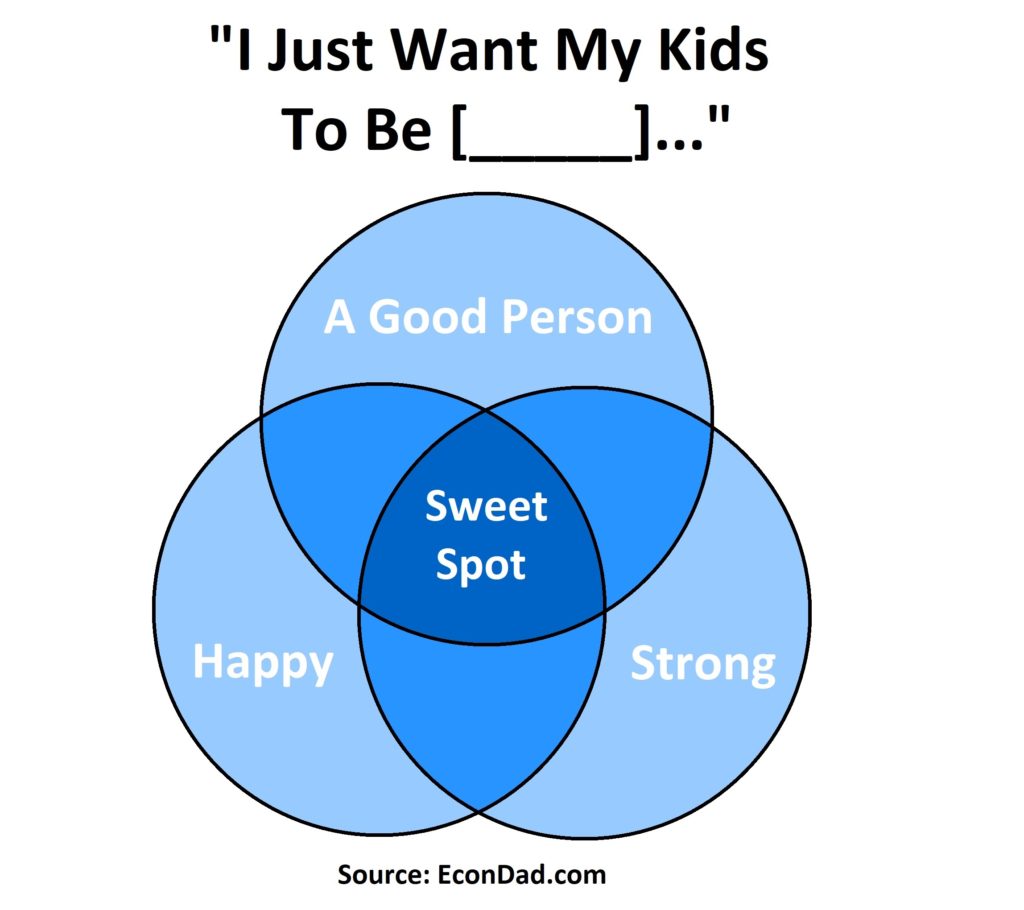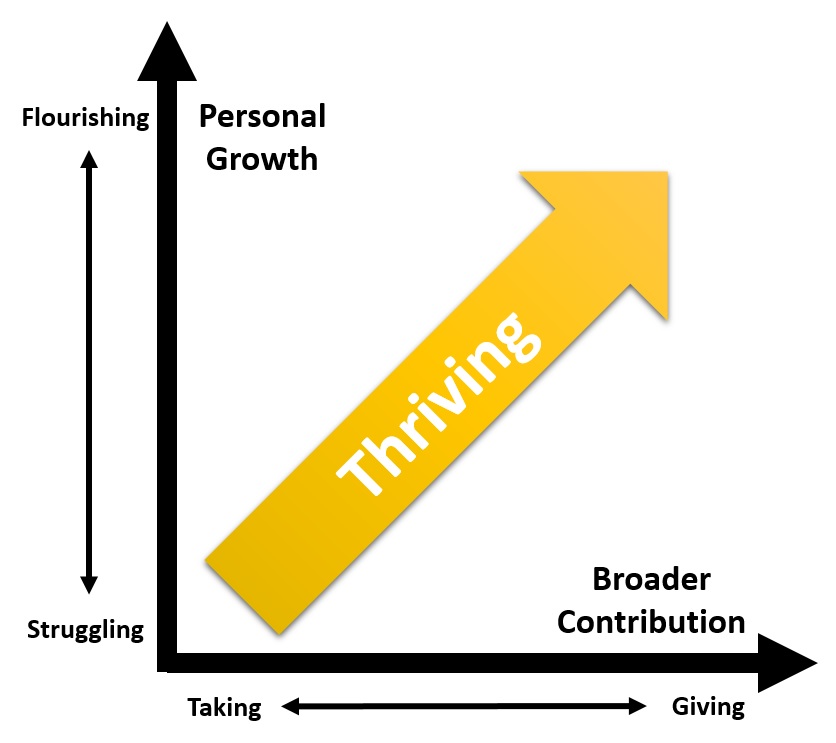I’m guessing that many parents have used this phrase: “I just want my kids to be happy.” It makes sense — we all want our kids to be happy, right? Or do we? In fact, is happiness what we’re aiming for in raising our kids? Is it what we should be aiming for and teaching them?
Well, it’s a complicated question. Let’s dig in…

Why not just happiness?
Let’s start with the obvious first question: why not just aim for our children’s happiness as parents?
It’s not that I’m against happiness for my kids, it’s just that it’s a bit limiting relative to the richness of life. There’s more to life than just being happy. Consider these examples…
1. Happiness drug. A favorite professor of mine liked to ask the class: “If you could take a drug that would make you eternally happy, but in a state of stupor and untruth, would you take it? If not, why not?” It’s a great thought experiment. If you could safely dull down your life to pure hedonistic pleasure, at the expense of truth and awareness, would you do it? Current drugs aren’t too far from this, so why aren’t you doing so already?
Aldous Huxley captured this notion perfectly in Brave New World, with the drug soma, which produces calming happiness for societal compliance. But, to take a modern day example, I think many of us would agree that a life drugged up on opioids isn’t quite the life best lived. Or, if you knew you were in The Matrix, would you exit it knowing that your real life would be worse than the fantasy?
2. WALL·E. A favorite Hollywood example of the dangers of hedonistic pleasure is WALL·E, where the space-bound future of the human race involves floating around with screens and shakes. Is that the kind of pleasurable existence we’re striving for? These future humans have actually become an iconic symbol of a life not worth living, even though, to some degree, I can see the appeal:

I remember my own journey from years ago on the role of happiness in life. I remember sitting on the beach as a college student, reading Nietzsche for one of my classes (or at least trying to), and realizing that it’s not just happiness that we’re aiming for with life. I remember bringing it up with my girlfriend at the time, who, I’m pretty sure, looked at me like I was either crazy, or stupid, or both. I’m slightly embarrassed to report that I didn’t realize until my early 20s that there’s more to life than happiness — but it took some growing up and maturing for that to sink in.
Here’s a more modern example, from Jordan Peterson’s 12 Rules For Life, on the importance of pursuing meaning over expediency. Expediency used here, as I read it, refers to hedonistic impulse and pleasure-seeking. Here’s an excerpt from Rule 7: “Pursue what is meaningful (not what is expedient)“:
“Expedience is the following of blind impulse. It’s short-term gain. It’s narrow, and selfish. It lies to get its way. It takes nothing into account. It’s immature and irresponsible. Meaning is its mature replacement. Meaning emerges from the interplay between the possibilities of the world and the value structure operating within that world. If the value structure is aimed at the betterment of Being, the meaning revealed with be life-sustaining. It will provide the antidote for chaos and suffering. It will make everything matter. It will make everything better.
If you act properly, your actions allow you to be psychologically integrated now, and tomorrow, and into the future, while you benefit yourself, your family, and the broader world around you. Everything will stack up and align along a single axis. Everything will come together. This produces maximal meaning. This stacking up is a place in space and time whose existence we can detect with our ability to experience more than is simply revealed here and now by our senses, which are obviously limited to their information-gather and representational capacity. Meaning trumps expedience. Meaning gratifies all impulses, now and forever. That’s why we can detect it.“
Jordan Peterson, “12 Rules For Life,” Random House Canada, 2018, p. 199. Emphasis added.
Bottom line: As adults, most of us know that there’s more to life than happiness. Once you accept that, you start wondering as a parent: What values am I aiming for when I raise my kids? Why? In which direction do I want to point them, among all the possible choices?
What are the options?
So, what are the options? Think about this quiz and try to answer it…
“I just want my child to be… [__________].”
- …happy —> seeking their own enjoyment of life
- …strong —> health, strength, ability, effectiveness
- …successful —> achievement, contribution
- …independent —> ability to follow own journey
- …a good person —> ethical interaction with the world
- …themselves —> knowing and understanding their own being
- …my friend —> a life companion
Clearly, there’s overlap among the factors. You can’t be successful without being independent, for example. The list also isn’t exhaustive — I want my kids to be smart, fun-loving, and a variety of other likable traits. There are a million things I could add to the wishlist.
But among the things we’re trying to teach them, what are the primary aims? What are the primary objectives that you’re targeting as a parent? In economics, we call this an objective function — what is it that you’re trying to maximize, exactly?
Try this thought experiment. Instead of choosing just one from the above list, what percentages would you assign to each one? What’s your rank order? Feel free to add your own.
“I just want my child to be… [__________].”
- [_]% happy —> seeking their own enjoyment of life
- [_]% strong —> health, strength, ability, effectiveness
- [_]% successful —> achievement, contribution
- [_]% independent —> ability to follow own journey
- [_]% a good person —> ethical interaction with the world
- [_]% themselves —> knowing and understanding their own being
- [_]% my friend —> a life companion
- [_]% [_____] —> add your own!
What are your targets as a parent?
What targets did you choose? Here are my percentages… (subject to refinement based on the complexities of parenting and life…!)
- 40% weight to strong
- 30% weight to a good person
- 30% weight to happy
Strong: 40%. At least lately, my top priority has been focusing on my children’s overall strength as humans. Strength of mind, strength of body, strength of character. I want my children to have the health, ability, and confidence to know that they can stand strong and pursue whatever they think is worthwhile in life. “McDuffs can do anything” — we can’t to everything, of course, but we can do anything we set our minds to. And you need strength to get you there. “Strong” is the word that comes to mind for me on a daily basis: I want my kids to be strong in whatever they choose to pursue in life. When I tell my kids to brush their teeth, or do their homework, or develop other good habits, I do it with strength as the end goal — not happiness, per se, though developing good habits can lead to both.
A Good Person: 30%. As my second item, I’m focusing on teaching them to be a good person, if I can. To me, this seems like one of the biggest areas of parental influence: teaching right from wrong, teaching children to treat others the way they want to be treated, teaching them that there are real consequences and suffering from bad choices. This one takes years of effort and modeling of our own choices for it to have any chance of sinking in. But it’s high on my list.
Happy: 30%. While not my top item, happiness still makes the list. We work hard to promote within our children a sense of self-esteem, enjoyable experiences, and teaching the kids to follow joy. I want them to pursue happiness, of course, but within the other constraints they face: responsibility, societal contribution, being a good person. While happiness makes my list, I would encourage them to make it secondary behind strength and being a good person, if they can.
It’s not that I don’t care about the other values, it’s just that I give them less emphasis than these three. Said another way, it would be wonderful if I could hit the sweet spot in aiming for my children to be Strong, Happy, and A Good Person:

We’re kidding ourselves, of course, if we think we can simply “impart” these values on our kids, not without a lot of work at least. We can do our best to provide guidance on what to value, and provide training wheels for those values.
I fully recognize that my children will grow up and assign their own weights to various values. Maybe they’ll agree with mine, or maybe they won’t. But they need early support and guidance to help develop a positive direction. Hopefully, over time, I can nudge them towards values that I think are worthwhile.
Here’s another thought experiment: Do your answers change if you think about what you’re targeting versus what you’re hoping for. For example, I hope that my children will become lifelong companions of mine. I hope that they seek success in the domain of their choosing. But I’m not teaching those as life values. I wouldn’t feel like a failure as a parent if neither of them occurred — although, I would be sad if we grew apart as they grew up. I obviously hope that they become lifelong companions, and try to foster that as best I can, but it’s not something I view as an intrinsic value they should hold, if they choose not to.
How about your own life?
Here’s another question: What percentages would you assign for your own life? If those are different than for your child’s life, why is that?
For my own life, I gravitate towards concepts like:
- 50% weight to supporting my family
- 20% weight to contributing to the world
- 30% weight to enjoying the ride
In the past, I’ve used the term thriving to describe the combined pursuit of flourishing in one’s own life with contributing to the world:

What’s interesting here is that I’m shooting for slightly different concepts and weightings for my own life than I am for my kids’ lives. Primarily, this reflects different life stages for parents versus children. Parents are in the provider phase of life — hunting the elk for our families — which is dominant right now in terms of priority. I’m sure this will change over time as our children grow into adults.
For my children, I want to give them a proper foundation of strength and goodness so that they can grow up to choose their own values and pursuits. Maybe they form a family of their own, maybe not. Maybe they contribute to the world in different ways than I have, which they almost certainly will.
I hope they choose things like contribution and being a good person, but I’ll have little control over that when they’re grown. For now, I’m focusing on strength — helping them develop the tools to be effective in life — and then beyond that the basics of being a good person and seeking happiness if they can.
Final thought
I don’t think there’s a single right answer here. It’s complicated, obviously, much more so than being able to boil down life into simple percentages (even for an economist!). I’m certainly not claiming authority on what you should value, but I think there’s wisdom in sharing and listening to what each of us is aiming for.
I hope that you’ll consider the following: (1) that you think about your own values and what you’re trying to impart on your children, (2) that you aim beyond happiness, and (3) that you consider how you might instill those values in your children, to the extent possible.
As parents, that’s the best we can do.

Readers: What percentages did you assign, and why? Are there any primary endpoints that I’m missing from the list? What do you suggest in terms of strategies for teaching our children about the right values?